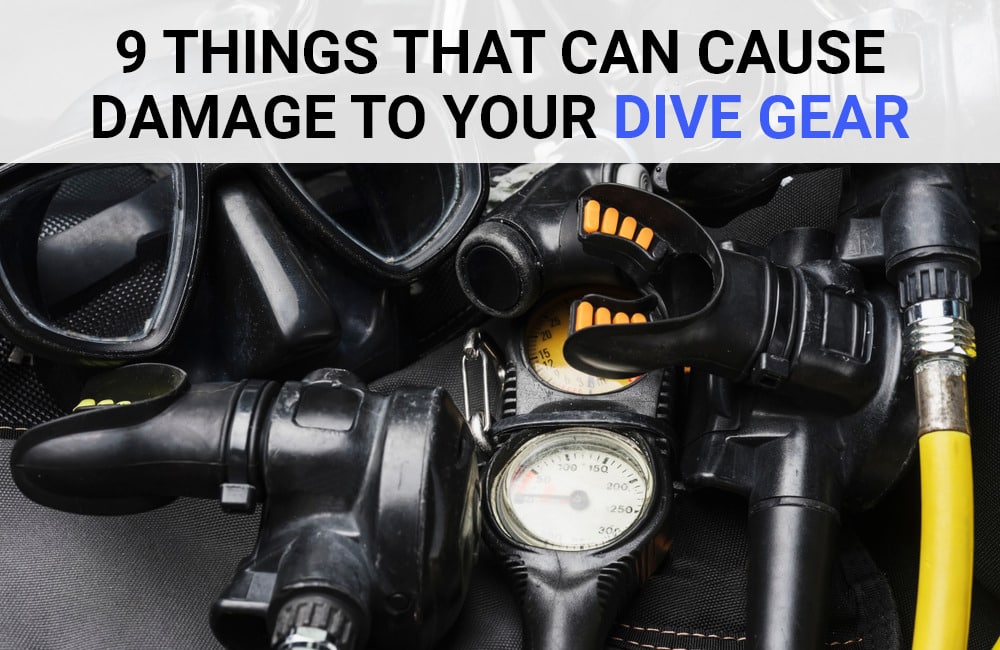Whether you’re an experienced diver or a newbie, you know that keeping your dive gear in top condition is essential for ensuring that each underwater experience is safe and successful. But do you know what can damage your dive gear?
From exposure to sunlight and salt water to improper maintenance, it’s important to understand the things that can harm your equipment so that you can protect them from potential damage. In this blog post, we’ll look at nine sources of danger to help divers better maintain their dive gear.
Excessive Sunlight 
One thing to be wary of is excessive sunlight. While it may seem harmless, the sun can cause damage to dive gear such as wetsuits, fins, and even masks. The ultraviolet rays in sunlight can break down the materials in these items over time, leaving them brittle and prone to tearing or cracking.
To combat this, it’s important to store your gear in a cool, dry place away from sunlight when not in use. Additionally, investing in gear specifically designed to withstand prolonged exposure to the sun can help you avoid costly replacements down the line. By being mindful of the effects of sunlight on your dive gear, you can prolong its lifespan and enjoy your underwater adventures worry-free.
The Sand 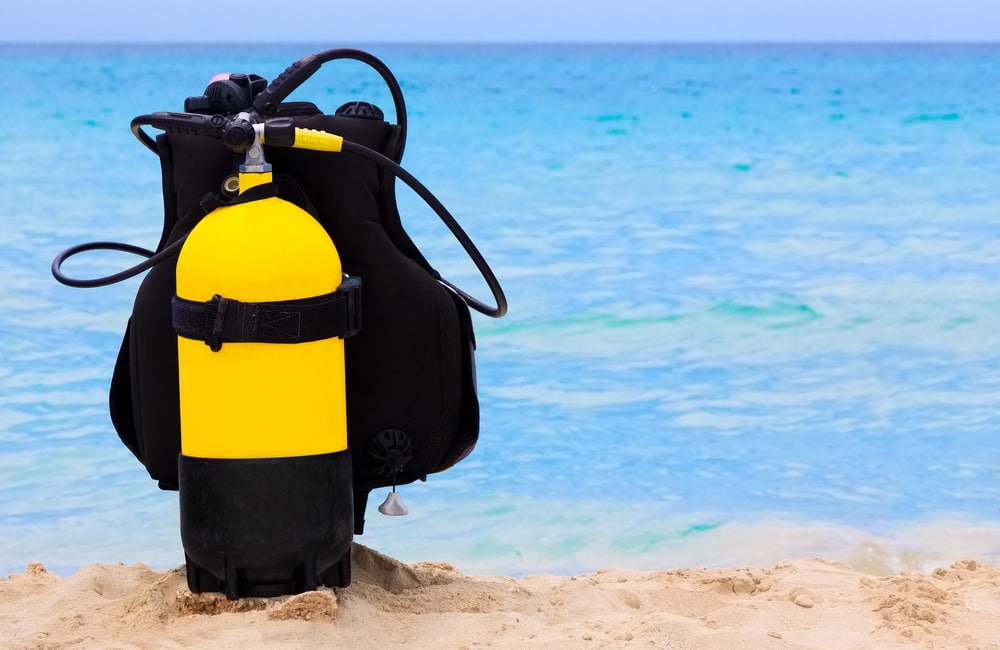
One of the biggest culprits of damage to your equipment is the sand. Sand can cause scratches and abrasions to your gear, particularly to the delicate lenses of your mask and the rubber on your fins.
The best way to prevent this damage is to keep your gear off the ground and out of the sand. Always store your gear in a safe and secure location before and after your dive and be mindful of where you’re placing your equipment when you’re preparing for your dive.
By taking steps to protect your gear from the damaging effects of sand, you’ll be able to enjoy all the wonders that diving has to offer for years to come.
Saltwater 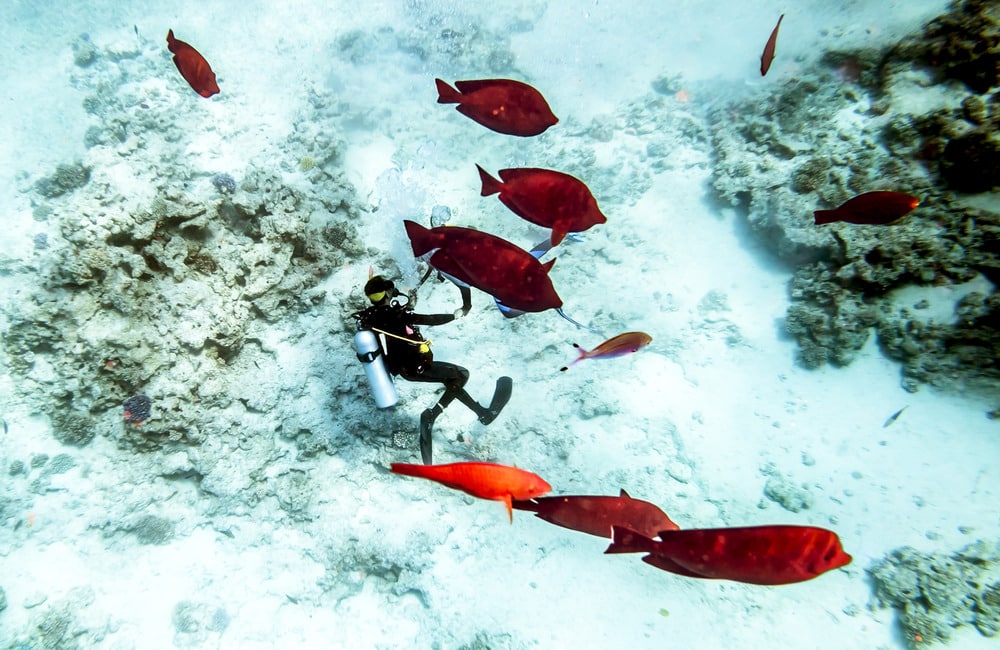
One of the lesser-known dangers is the threat that saltwater poses to your gear. Saltwater, as you might already know, can take a toll on just about anything it comes into contact with – and this includes your diving equipment. Whether it’s your regulator, your wetsuit, or your dive mask, saltwater can cause corrosion, wear and tear, and other types of damage that can be expensive to repair.
That’s why it’s essential to make sure you’re taking the necessary precautions to protect your gear from the harmful effects of saltwater. This might mean rinsing your gear after every use, properly storing it between dives, or investing in saltwater-resistant gear that’s specifically designed to withstand these types of conditions.
Chemicals 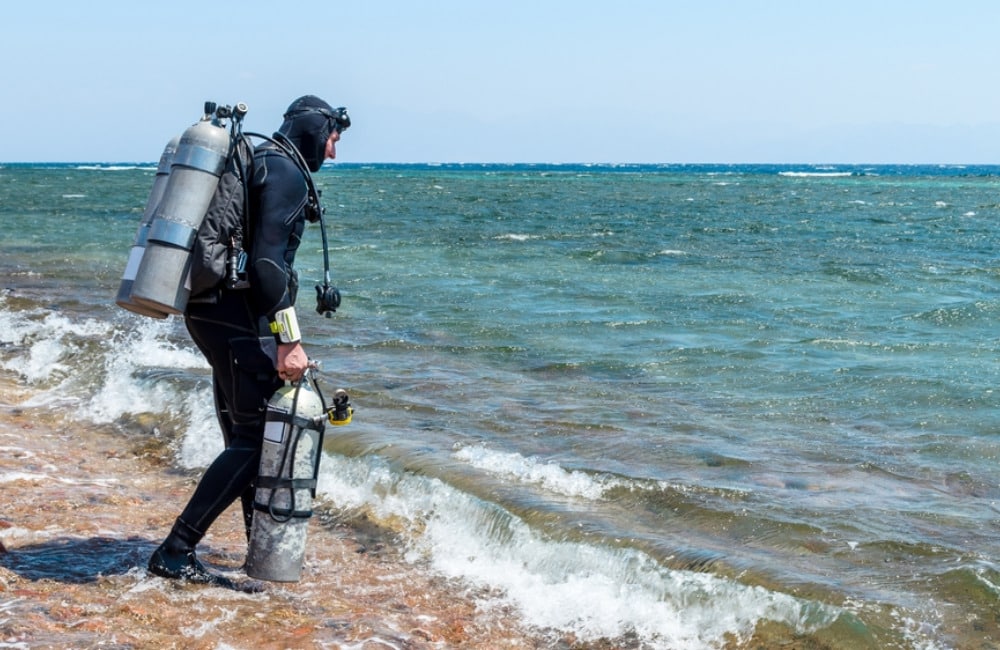
It’s essential to keep in mind that chemicals can cause severe damage to your dive gear. Exposure to harsh chemicals like gasoline, bleach, and solvents can break down your wetsuit, dry suit, and dive bag material.
It can affect the buoyancy of your dive gear, cause it to crack, and, in some cases, become unusable. Hence, it’s vital to handle chemicals carefully and ensure that your dive gear doesn’t come into contact with them.
Always wash your gear in freshwater after each dive and store it away from any chemical or corrosive substance to protect your investment and ensure your safety during your underwater adventures.
Poor Storage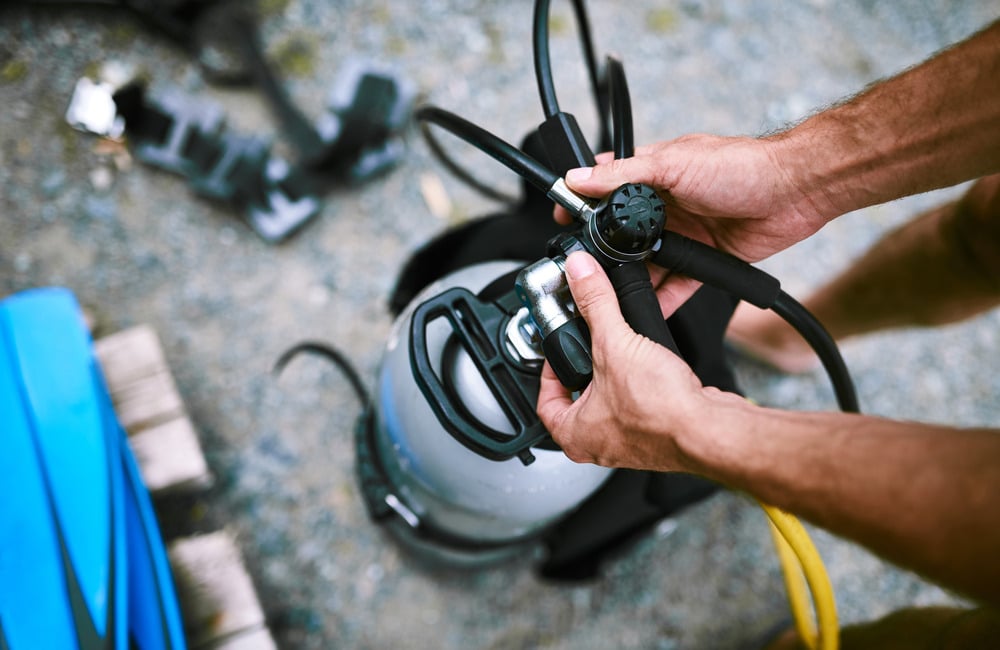
Properly storing your dive gear is essential for maintaining its longevity and performance. Leaving your equipment in inappropriate conditions can lead to various forms of damage over time. Here are some common mistakes to avoid when it comes to storing your dive gear:
- Exposure to Sunlight: Leaving your gear exposed to direct sunlight for extended periods can cause materials like rubber and neoprene to degrade and lose their elasticity. Store your equipment in a cool, dry place away from direct sunlight.
- Damp or Wet Storage: Storing wet or damp gear in a confined space can promote mold and mildew growth, leading to unpleasant odors and potential health risks. Always rinse and thoroughly dry your gear before storage.
- Sharp Objects: Keep your dive gear away from sharp objects that could puncture or tear materials like wetsuits, BCDs, or drysuits. Use padded bags or dedicated gear containers to prevent accidental damage.
- Compression: Avoid compressing your wet or drysuits for extended periods, as it can damage their insulating properties and reduce their effectiveness. Instead, hang them on broad-shouldered hangers to maintain their shape.
- Proper Drying: Make sure your gear is adequately dried after each dive. Storing damp equipment can lead to foul odors, mold, and deterioration of materials.
By following these guidelines for proper storage, you can extend the lifespan of your dive gear and ensure it’s always ready for your next underwater adventure.
Being Unaware
Lack of awareness about your surroundings and potential hazards during diving can inadvertently cause damage to your gear. Here are some scenarios where being unaware may lead to gear damage:
Collisions
Failing to be aware of your surroundings and other divers can result in accidental collisions, potentially damaging sensitive dive equipment like gauges, cameras, or regulators.
Dragging Gear
When entering or exiting the water, be mindful of dragging your gear on rough surfaces, as this can cause scratches, abrasions, or even more severe damage.
Entrapment
In confined spaces or around underwater structures, unawareness may lead to entangling your gear, risking damage to hoses, dive lights, and other equipment.
Incorrect Weight Distribution
Not being aware of your buoyancy and weight distribution can put unnecessary strain on your gear. Ensure you are properly weighted and maintain proper buoyancy control during the dive.
Flora and Fauna
Touching or interacting with marine life or delicate underwater structures can harm both the environment and your gear. Avoid contact with corals, sponges, or any living organisms.
Poor Buoyancy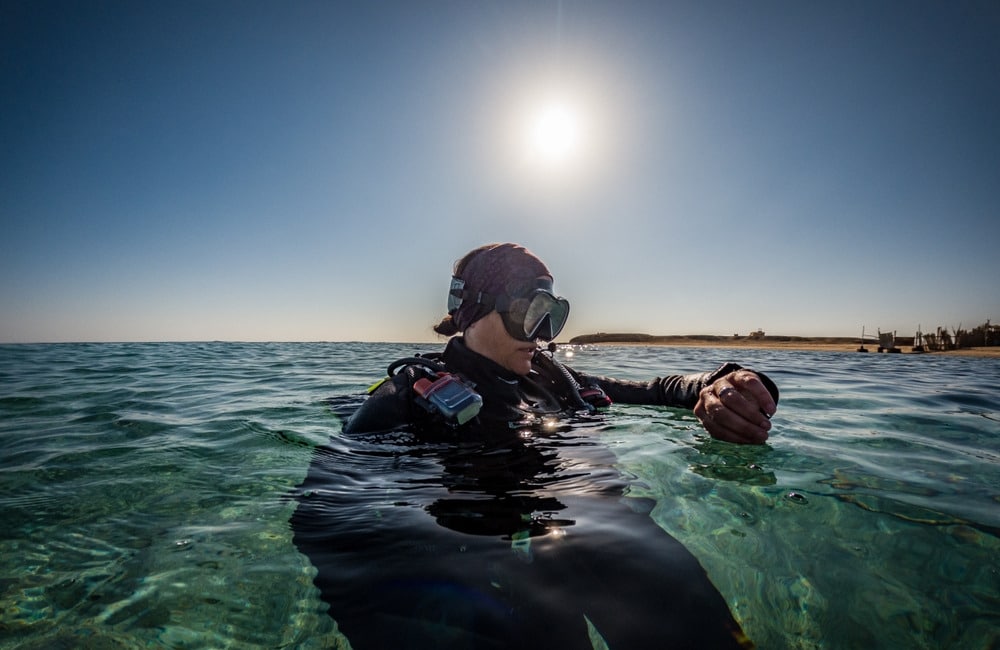
Buoyancy control is a fundamental skill in diving, and poor buoyancy management can lead to damage to your gear and the environment. Here’s how poor buoyancy can cause damage:
- Kicking the Bottom: Constantly kicking the seafloor can stir up sediment and cause damage to underwater habitats. It may also lead to damage to fins or other equipment.
- Descents and Ascents: Rapid descents and uncontrolled ascents can cause stress on your gear, potentially leading to leaks or damage to hoses and connectors.
- Bumping into Objects: Lacking proper buoyancy control may cause you to bump into rocks, shipwrecks, or other dive site features, risking harm to both yourself and your gear.
- Entanglement: Being unable to maintain neutral buoyancy may result in entanglement in underwater vegetation or debris, leading to potential gear damage.
- Air Consumption: Poor buoyancy can lead to inefficient air consumption, which may shorten your dive time and reduce your overall enjoyment.
By practicing and improving your buoyancy skills, you’ll not only protect your dive gear from damage but also contribute to preserving the fragile marine ecosystem.
Wetsuits in The Washing Machine
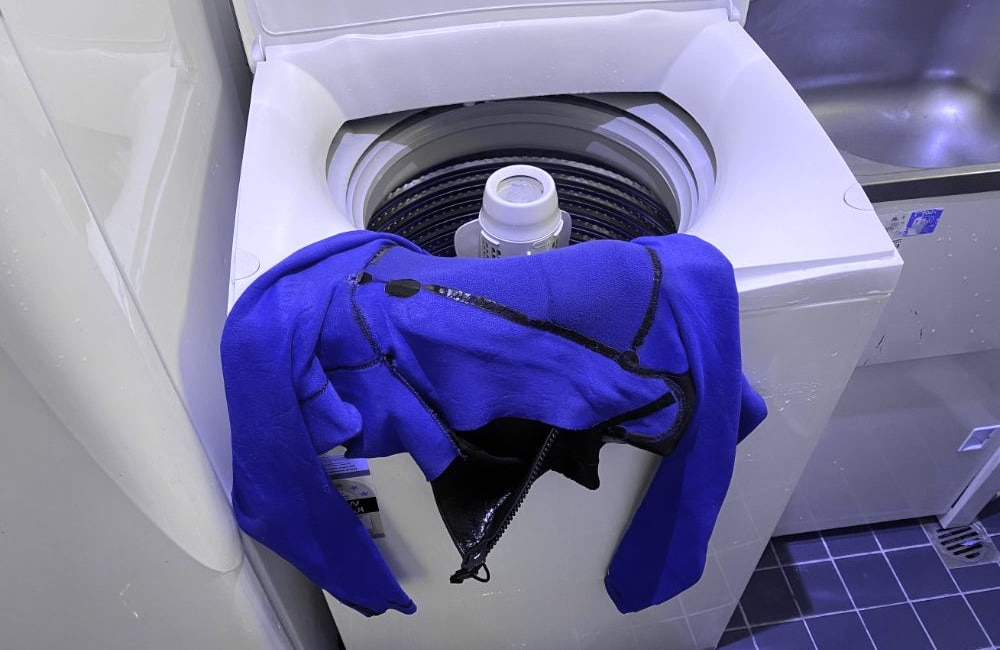
Cleaning your dive gear, including wetsuits, is essential for maintaining hygiene and preventing the buildup of bacteria and unpleasant odors. However, throwing your wetsuit in the washing machine can lead to irreversible damage. Here’s why:
- Agitation and Abrasion: The washing machine’s agitator can cause excessive rubbing and abrasion on the neoprene material, leading to tears or weakening of the fabric.
- High Temperatures: Some washing machines use hot water, which can damage the neoprene and cause it to lose its elasticity.
- Detergents and Bleach: Household detergents and bleach can harm the neoprene and the suit’s glue, stitching, and seals.
- Spin Cycles: High-speed spin cycles can twist and stress the wetsuit, causing damage to seams and zippers.
Instead of using the washing machine, hand wash your wetsuit with mild soap and cool water, rinse thoroughly, and hang it to dry away from direct sunlight. This gentle approach will keep your wetsuit clean and in good condition for many dives to come.
Disassembling Gear Without Proper Training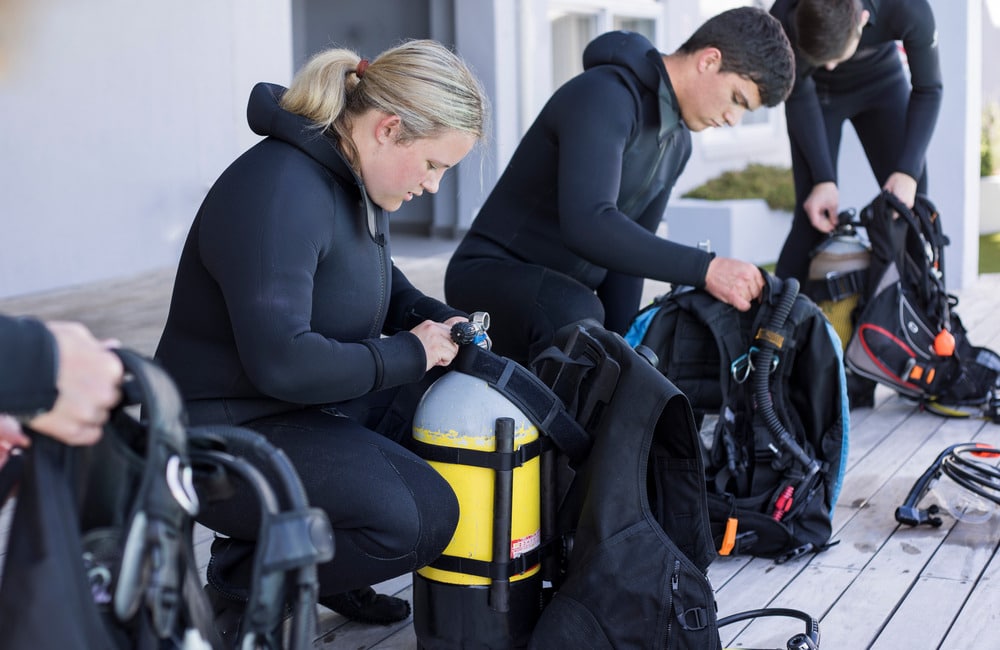
Dive gear, especially complex equipment like regulators and dive computers, should only be disassembled and serviced by certified and trained professionals. Attempting to disassemble and service your gear without proper training can lead to severe damage, compromising your safety and the performance of the equipment. The intricate inner workings of regulators and dive computers require precision and expertise to maintain properly.
- Seals and O-rings: Mishandling O-rings or failing to replace them correctly can result in leaks and malfunctions, affecting the performance of your gear.
- Calibration: Incorrectly calibrating dive computers or making unauthorized adjustments can lead to inaccurate readings and potentially dangerous situations underwater.
- Warranty Void: Unauthorized disassembly and tampering with equipment may void the manufacturer’s warranty, leaving you responsible for any repairs or replacements.
- Personal Safety: Faulty gear due to improper servicing can put your safety at risk and compromise your diving experience.
To ensure your dive gear is well-maintained and safe to use, always have it serviced by authorized technicians who have the proper training and tools. Regular maintenance and servicing will extend the life of your gear and give you peace of mind during your dives.
